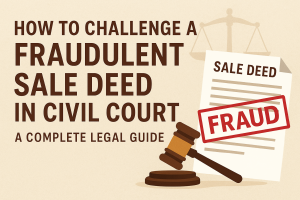The Intersection of Revenue Law and Data Privacy: Challenges in Land Digitization
As India embraces digital transformation, one of the most ambitious reforms has been the digitization of land records under initiatives like Digital India Land Records Modernization Programme (DILRMP) and SVAMITVA Scheme. These efforts aim to enhance transparency, efficiency, and accessibility in the land revenue system.
However, the transition from traditional record-keeping to digital land databases brings new challenges — especially concerning data privacy, security, and legal accountability. This evolving intersection of Revenue Law and Data Privacy calls for a careful legal balance between modernization and protection of citizens’ rights.
1. Legal Framework Governing Land Digitization
Land and revenue administration in India is primarily governed by state-specific revenue laws, such as:
-
The Gujarat Land Revenue Code, 1879
-
The Rajasthan Land Revenue Act, 1956
-
The Maharashtra Land Revenue Code, 1966
With digitization, these frameworks now interact with new-age legislations like the Digital Personal Data Protection Act, 2023 (DPDP Act), which regulates the collection, storage, and sharing of personal data.
This overlap means that land record authorities, traditionally focused on ownership and taxation, now also have data fiduciary responsibilities—to protect sensitive personal information such as ownership details, Aadhaar-linked records, and financial data used in property registration.
2. Data Privacy Concerns in Land Digitization
Digitization of land records introduces multiple privacy risks:
-
Unauthorized Access: Centralized online portals make vast amounts of personal data accessible to multiple departments, increasing exposure risks.
-
Identity Theft & Fraud: Linking land records with Aadhaar or PAN data, without sufficient safeguards, creates opportunities for misuse.
-
Transparency vs. Privacy: Public access to ownership data improves transparency but can also violate privacy if data is misused by private entities.
-
Cybersecurity Vulnerabilities: Many state-level land portals lack advanced encryption or real-time monitoring systems, leaving sensitive data open to attacks.
3. Balancing Transparency with Privacy
Revenue law emphasizes public access to land records — a principle rooted in promoting transparency in ownership and preventing disputes. However, with digital systems, there is a need to redefine “public access” in light of modern data protection principles.
The challenge lies in ensuring:
-
Data is accessible only to legitimate users (owners, officials, and relevant agencies).
-
Access logs and permissions are monitored and auditable.
-
Only non-personal or de-identified data is made publicly visible.
The DPDP Act offers a starting point by requiring consent-based data processing and accountability by data fiduciaries. Integrating these standards into revenue systems is essential for compliance and trust.
4. Role of Technology in Safeguarding Data
Emerging technologies like Blockchain and AI-based verification can bridge the gap between transparency and privacy. Blockchain, for example, allows tamper-proof, traceable entries without exposing raw personal data, while AI can help detect anomalies and flag fraudulent transactions.
Implementing cyber audits, role-based access control, and data encryption policies within revenue departments can strengthen data integrity and build citizen confidence in digital governance.
5. The Way Forward
The future of India’s land revenue system depends on synchronizing traditional laws with digital governance norms.
-
Legislatures must amend state revenue codes to include provisions on data privacy, digital signatures, and electronic evidence.
-
Regular training of revenue officials on data protection protocols is crucial.
-
Collaboration between legal experts, IT professionals, and policymakers can ensure that efficiency does not come at the cost of citizens’ privacy.
Conclusion
Land digitization is undeniably a milestone in India’s administrative modernization. Yet, it must evolve within a secure legal ecosystem that respects both transparency and privacy. The intersection of Revenue Law and Data Protection will shape the next chapter of property governance — where technology serves justice, without compromising personal rights.



